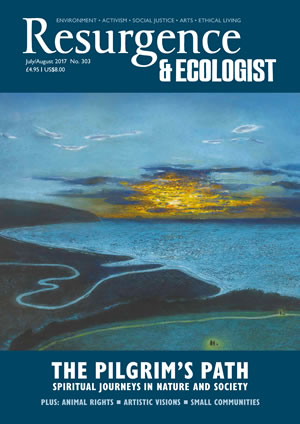For centuries, islands have captured the imagination. We have been drawn to their shores in search of solitude, refuge and the romance of ancient mythology. As symbols of the ‘otherworldly’, their remoteness has taken us beyond the safe and familiar, testing our mental and physical limits. They have been sought after as places of pilgrimage and spiritual retreat, they have nurtured creative freedom stifled by the relentless demands and predictability of modern life.
In Love of Country, Madeleine Bunting explores the magnetic pull of the Hebrides, pounded by the Atlantic Ocean off the north-west coast of Scotland, and takes us into their distinctive histories.
Her view of life on the edge is unsentimental. Whilst enchanted by the natural beauty she encounters, she illustrates how luminous calm can shift quickly to merciless broil. The elements are emphatically in control, making island life harsh and precarious. “Islands don’t lend themselves to grand plans and big theories – the weather is too fickle.”
The Hebrides, Bunting writes, have a particularly potent habit of throwing us off course. “They disrupt the best-laid plans, sabotage the most cherished fantasies and offer the most startling – and seductive – surprises.”
Being thrown off course has long inspired writers and artists, both as a liberating and potentially unsettling experience. For Boswell and Johnson, in the 18th century, the islands were delightful places of retreat, but the torment and frustrations of boisterous weather a bit much. In D.H. Lawrence’s novella The Man Who Loved Islands the main character loses a fortune (and subsequently his mind) in creating his “little world”.
In contrast, the Hebrides provided sanity and sanctuary for other 20th-century authors. George Orwell spent several years on Jura writing Nineteen Eighty-Four. A keen naturalist, he threw himself into the physical demands of island life. With a fresh perspective on the world he had left behind, he imbued the novel with all that was loathsome to him about industrial urban Britain and state authoritarianism. Other writers, such as Frank Fraser Darling and Hugh MacDiarmid, were passionate advocates for our reconnection with Nature in a world overshadowed by human aggression.
The Hebrides were no strangers to that aggression. As industrial society developed, the islands were treated as ripe for ‘improvement’, to increase productivity and make them more economically viable. During the 18th and 19th centuries, the Hebrides were, Bunting writes, “being relegated to a periphery – useful for the extraction of raw materials and as a supply of cheap labour”.
The commodification of land and people by the ‘improvers’ was fundamentally at odds with island values. The islanders’ beliefs, resonant with ancient Gaelic culture, were rooted in their interconnectedness with landscape, their history and their strong familial bonds. Community, sharing and cooperation were vital to their survival.
The significance the inhabitants placed on belonging, and on respect for one’s home, made particularly bitter the brutality of the 19th-century Clearances, with their evictions and enforced emigration, described in some depth in the section on the island of Rum.
The departure of so many islanders had a detrimental impact on Gaelic language and culture, but the language eventually experienced a revival. Bunting learned just how significant its survival was in her conversations with some islanders, describing Gaelic as “a language of community, offering concepts and expressions to capture the tightly knit interdependence required in this subsistence economy”.
Due to the resilience of their people, the Hebrides remain inhabited, and continue to welcome visitors. On her journey, Bunting forms a personal connection with the islands. They speak to her of histories in which she, “for good or ill”, stands. Her conclusion is both poignant and apt for the world we inhabit: “These histories have formed the dense weave of attachments across the British archipelago from which we now search for new definitions of nation to express and inspire human solidarity.”







